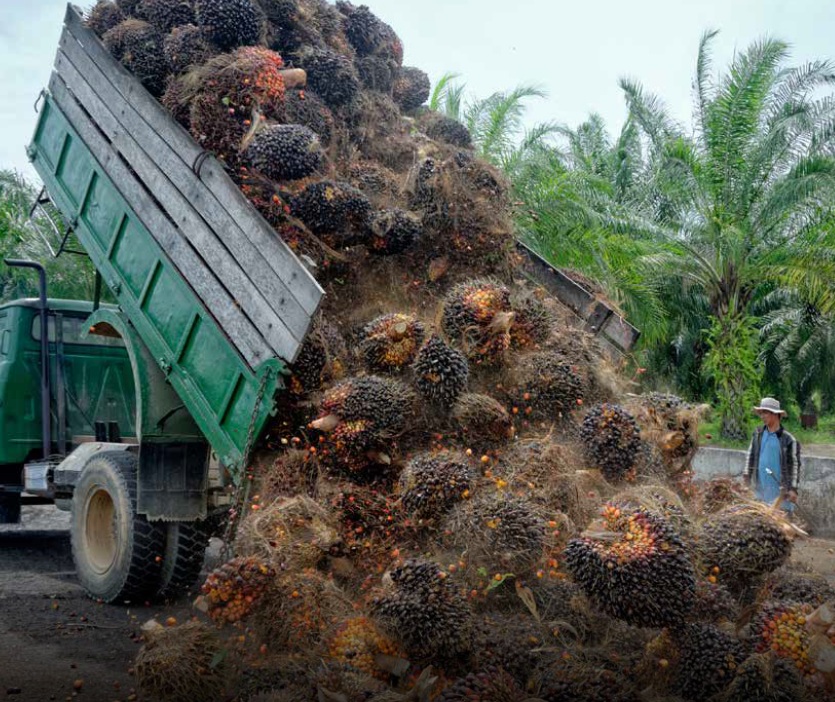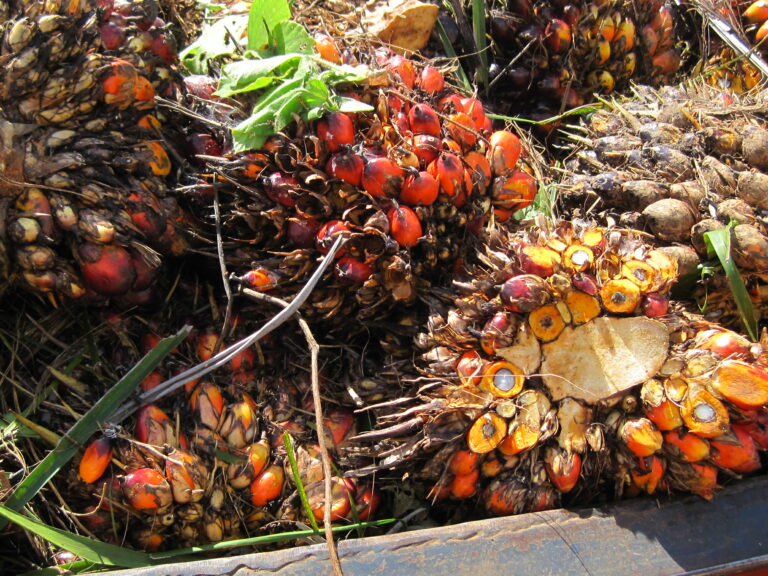
Roundtable on Sustainable Palm Oil (RSPO) companies are violating labour rights and human rights in Indonesia
Research carried out by SOMO shows that labour rights and human rights are being violated in Indonesia by companies who are signed up to the RSPO – an initiative to ensure ethical practices in the palm oil sector, and which this week holds its annual European Roundtable on Sustainable Palm Oil.
Two of the palm oil companies investigated by researchers – both of which are RSPO certified – structurally violate labour rights, breach not only the RSPO’s own ethical standard, but also international law, Indonesian law – or both. The research reveals how the palm oil companies investigated systematically employ children, while private and public security actors operate in the interests of the researched palm oil and logging businesses rather than protect the rights of local people. Several community members have been killed for protesting against the companies’ operations.
Rights violations and child labour at palm oil plantations
In recent years, many Dutch companies have joined the Roundtable on Sustainable Palm Oil (RSPO) in an attempt to make their palm oil supply chains more sustainable. By procuring RSPO-certified palm oil, these companies want to ensure the palm oil they buy has been produced (among other things) without labour rights violations or environmental degradation.
The case studies in SOMO’s report ‘Palming Off Responsibility’ for CNV internationaal focus on two RSPO-certified palm oil companies. In both cases, workers are forced to work unpaid overtime in order to reach unrealistic production targets. Other rights violations found by the field research included the disruption of unions, workers receiving no employment contracts, inadequate provision of protective equipment and inadequate medical services. Furthermore, managers have pushed workers to bring their wives and children to work, giving rise to child labour.
Many workers’ rights violations were found that breach one or all of: the RSPO’s own standards, international law or Indonesian law. The RSPO is therefore certifying palm oil produced by companies that commit exactly the types of human rights and environmental violations that motivated the creation of the roundtable.
Violent displacement of people living in palm oil and logging concessions
Research for SOMO’s ‘The two hats of public security actors in Indonesia: protecting human rights or preserving business interests?’ report into the role of security actors in palm oil and logging concessions (which involved fieldwork in Sumatra in July and August of 2016) reveals a deliberate erosion and violation of the rights of local people. Violence and intimidation takes place on a structural basis, and is carried out by both public and private security providers. Palm oil company Asiatic Persada (AP) and logging company Wirakarya Sakti (WKS) are responsible for these abuses committed by the security providers they work with, and should be held accountable.
The two hats of public security actors in Indonesia
Asiatic Persada was owned by RSPO member Wilmar International until 2013. Due to the human rights violations that took place with involvement of the company, local communities filed official complaints with both the RSPO and the International Finance Corporation’s Compliance Advisor Ombudsman. However, both complaint processes were stopped when Wilmar International sold Asiatic Persada to the Ganda Group, a company that has no affiliation with either institution. In light of this, the researchers call upon the RSPO to critically evaluate how it can better deal with situations where its members dispose of assets for which complaint procedures are underway.
“In the context of weak rule of law in the areas where AP and WKS operate, Indonesian security forces often do not protect local people’s rights but instead seem focused on protecting corporate interests – this has allowed company security personnel and state security officials responsible for human rights violations to operate with near impunity”, says Vincent Kiezebrink, researcher for SOMO. “The same goes for both companies: they have never been held directly responsible for their role. SOMO and the organisations that have commissioned the research are therefore calling for improved accountability of companies involved in human rights violations committed by security providers.”
About the research projects
‘Palming Off Responsibility’ focuses on labour rights violations and child labour in the palm oil sector and was commissioned by CNV international. ‘The two hats of public security actors in Indonesia: protecting human rights or preserving business interests?’ concerns the role of public and private security actors working with palm oil company Asiatic Persada, owned by the Ganda Group, and logging company Wirakarya Sakti, owned by the Sinar Mas group. This study was financed by the Netherlands Organisation for Scientific Research (NWO), and was carried out jointly with the University of Nottingham (UK) and Indonesian NGO Inkrispena.
Do you need more information?
-

Vincent Kiezebrink
Researcher
Related content
-
 ‘Roundtable on Sustainable Palm Oil’ announces investigation into Poligrow’s activitiesPosted in category:NewsPublished on:
‘Roundtable on Sustainable Palm Oil’ announces investigation into Poligrow’s activitiesPosted in category:NewsPublished on: -

-
Hungry for profits Published on:
 Vincent KiezebrinkPosted in category:Publication
Vincent KiezebrinkPosted in category:Publication Vincent Kiezebrink
Vincent Kiezebrink


